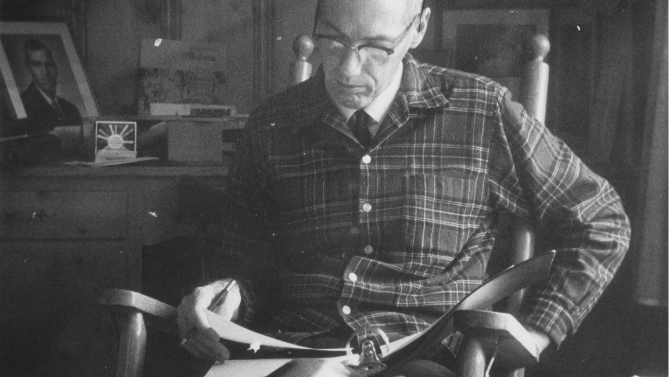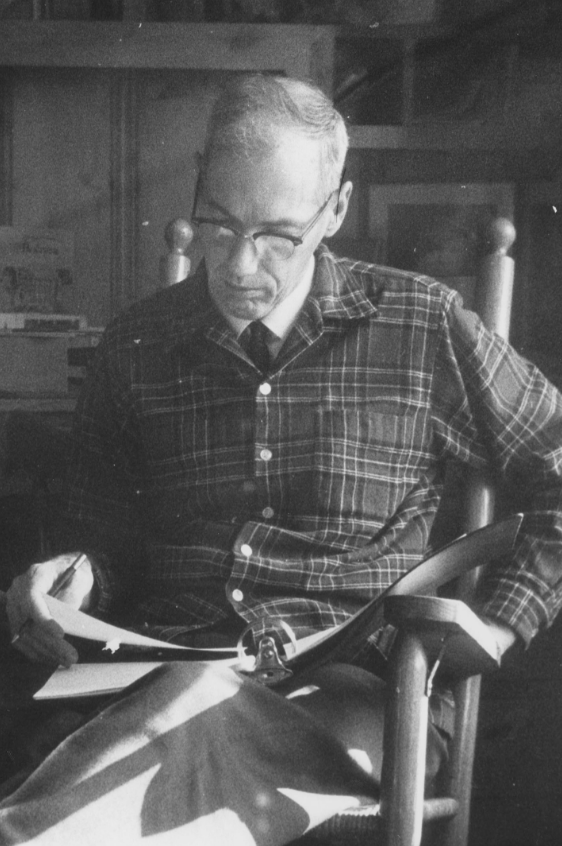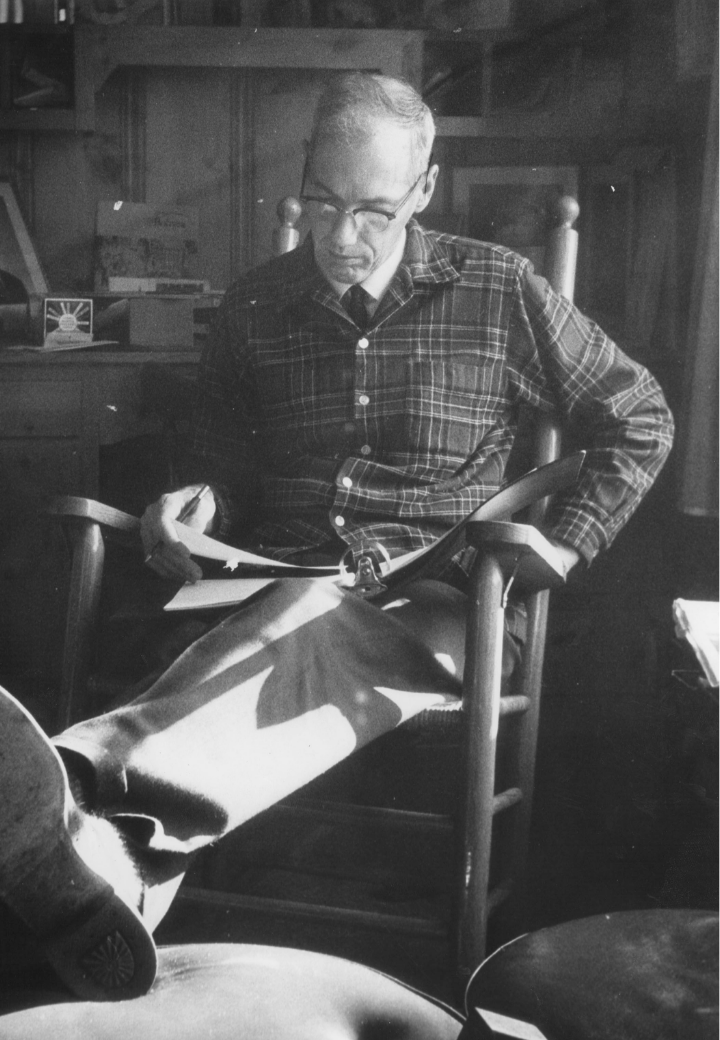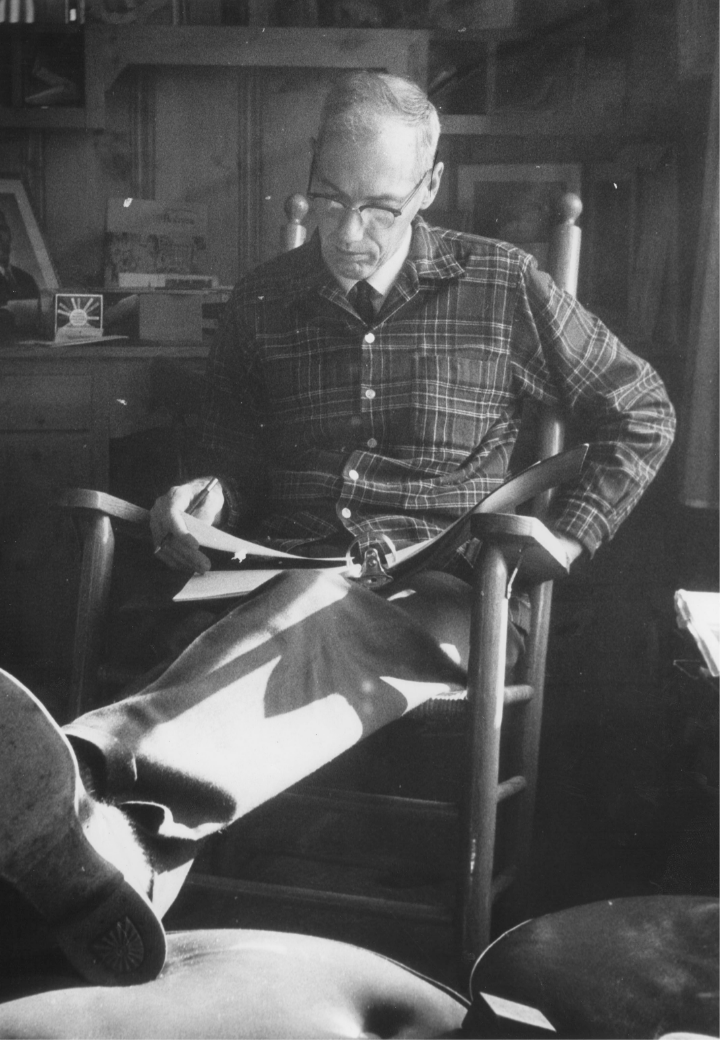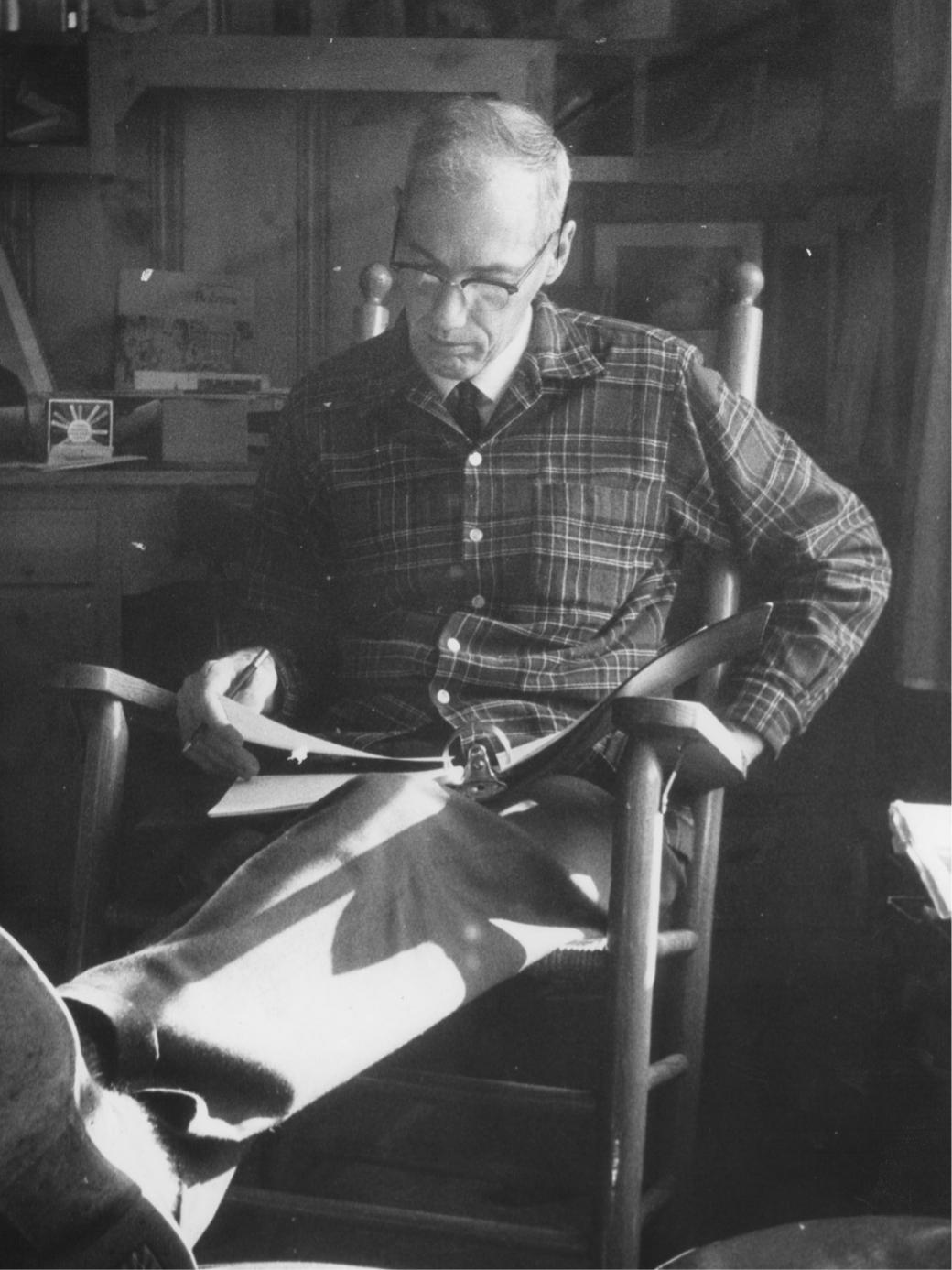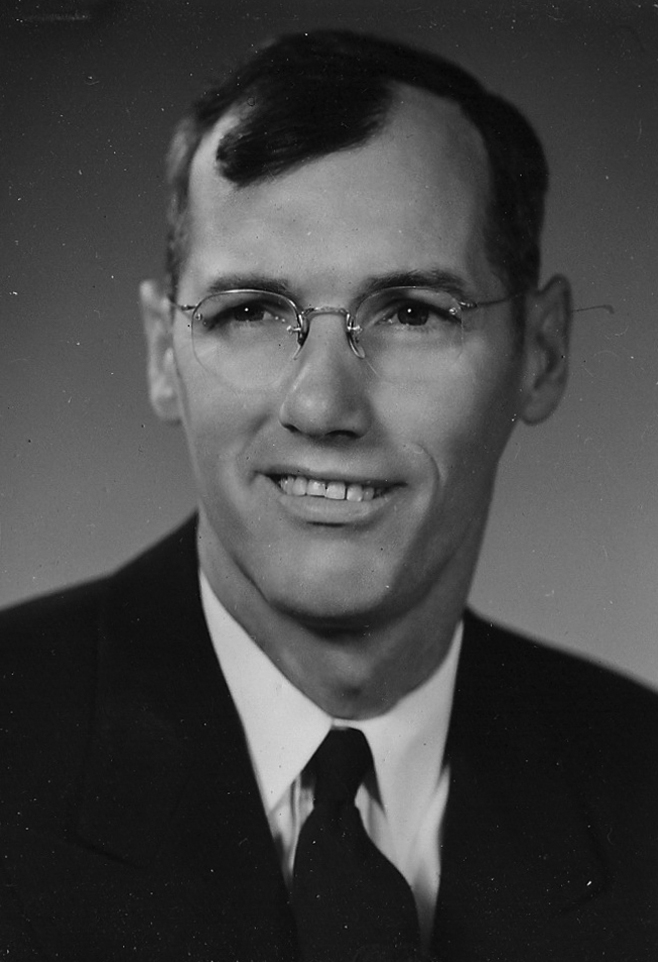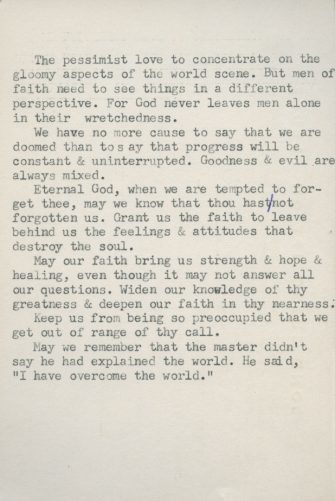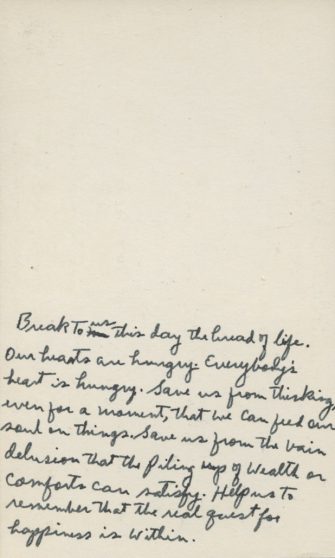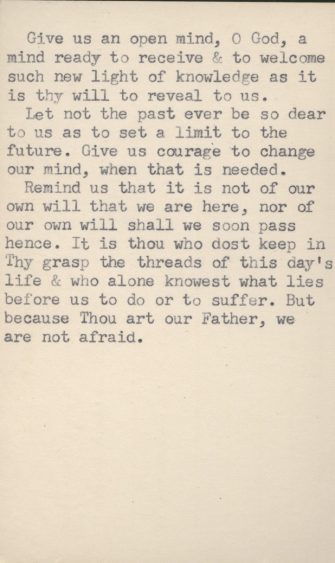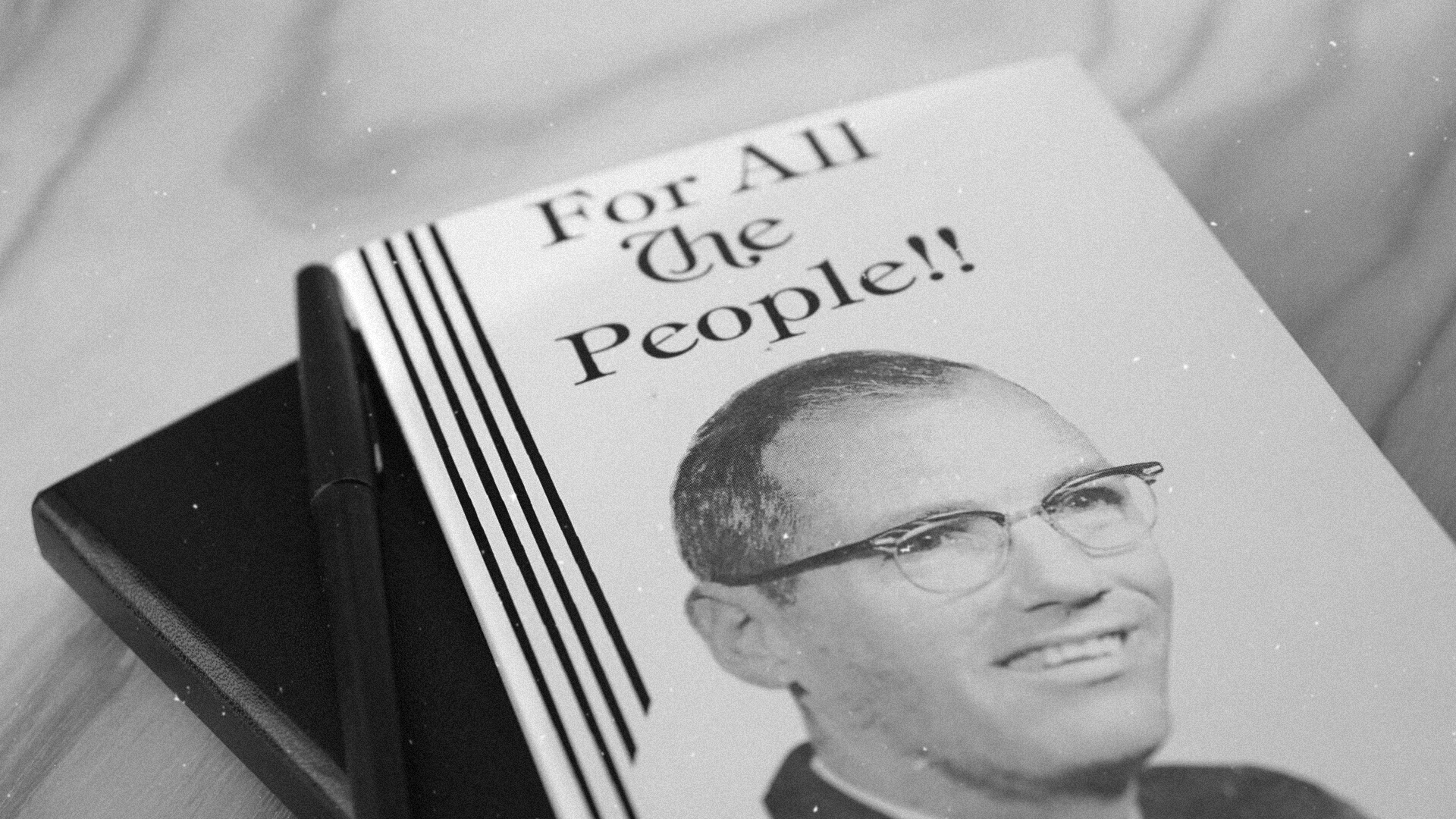At the out set it must be admitted that the first person pronoun will appear so often as to make it monotonous if not repugnant. But I have only had personal experiences regardless of how much I’ve tried to feel with, and for, other people. I do consider my amateur counseling ability to be among my best contributions during a ministry of more than thirty-six years.
My outlook on life is tied closely to my deep sense of stewardship. I feel that, as in the story of the talents, I am not only God’s servant but “he delivered unto them his goods.” What he left is entrusted. He is not holding a second mortgage. My Life is a loan that can be called in at any time. I am sure it wouldn’t be that simple if I were told I had three months or so to live, but I’d like to feel I could take the attitude that I’ve had a good and healthy life for 60 years. I haven’t deserved it; so why not be grateful for that instead of complaining and feeling self-pity?
I haven’t had a bed of roses in the ministry. As a Pastor I wouldn’t be called a “success” in many circles. I have always had an appointment with more than one church, with the exception of one four-year period. I’m not sensitive about it as many, both clerical and lay folk, may not be able to articulate it but are sure something is wrong with a preacher who never arrives to the place he has a high steeple church. It isn’t sour grapes. It just doesn’t bother me. It may be lack of ambition, but I feel God keeps the score and His records, I know, are superior to ours.
I didn’t enter the ministry because I wanted to from the start. I ran as long as I could and as hard as I could. I tried to trade with the Lord by being a teacher or an attorney and I intended to be a Christian in either. I tried to horse-trade with the Lord and learned he didn’t need any horses. I experienced what the man meant when he said,“ Your arm is too short to box with the Lord.” I’ve never regretted entering the ministry, that is left for those who have to hear me preach.
The words attributed to John Wesley as he saw a drunken man lying in the gutter, “There but for the grace of God lies John Wesley,” express my attitude. I don’t mean to limit this concern just to people with this problem. “Civilians” have the same character defects as alcoholics. I never tasted Liquor but have been accepted by a closed discussion group in AA for more than five years. I think if I drank I’d be an alcoholic. I can identify with many of their feelings and conflicts. It helps me roll with the punches when people can be so inconsistent in the way they live. I never speak except when I’m asked to comment.
I get as much as I give in AA. I don’t feel threatened when they talk about how “Church” people don’t understand and hoe they are put down by so may preachers who feel so uncomfortable around drunks. The church could not give the time and attention to 5 percent of its members that AA does (if this is an approximation of its people with alcohol problems). But on the other hand I do know with Paul Sherer “Too many church members get starched before they get washed.”
I am no administrator. Throughout school if an instructor insisted on an outline, I wrote the paper and then made him an outline. I’m not proud of this. An honest confession may be good for the soul but it doesn’t help your grade. Tied up with all this is the practice of fewer words but hopefully, more meaningful words. Just filling up the hour set aside for worship may satisfy my need to have said something, but it may not have met anyone’s need. There is a difference between having to say something and having something to say – just getting it out of my head may not get it into someone else’s. It’s different getting something off my chest and getting something off my heart. I had rather do one needful thing than to pass resolutions and talk about a thousand. How often we in the church waste time talking to ourselves instead of doing what is at hand. Often we are like the man that talks about conquering empires and hasn’t conquered the chicken coupe where he is. Too many of my members feel that when we’ve talked about something we’ve done it. The gap between our proclamation of the Gospel and our performance of the Gospel is a great gulf. Doing the “wind works” is not doing the works.
I have an inferiority complex that isn’t enough to be called abnormal perhaps, but it dogs my tracks, playing recordings from childhood. It has helped me do my homework better in preparation I don’t think well on my feet which makes me feel a real responsibility for sermon preparation. That still makes me type out my sermons. I have never taken a manuscript into the pulpit, but this makes me do better preparation and keeps me from too frequent repetition. It helps me to know what I want to say and to stop when I’m through. My philosophy of stewardship reminds me that if I have a congregation of one hundred and preach twenty minutes, that is one hundred times twenty – which makes a lot of minutes – and I owe it to people to prepare. My view of Christ is not the brittle, hard, demanding position. We are members of the Body of Christ; and if we claim to be the only right, we may end up being no part, not even a little toe. I have known groups that claimed to be the only correct proper church. But while I have no hot-line connection, I feel sure Christ would not stoop to their level. There are churches calling themselves “Christian” that Christ would not lower himself to join. They make demands he never made and display a spirit he would not share.
There are times when I seem to be able to make it on my own, and I’m sure this is normal and healthy. There are other times of discouragement and temptation when I must have help from the God of my understanding. I can ask God to help me endure or overcome some problem or difficulty and believe He is the Source of my help. Instead of asking for something when I don’t have much desire for it, and only asking because it sounds nice, I back off one step and ask God to give me the desire for what in my heart - in my best moments – I know is right and best.
There was a time when I was more concerned and thought more about going to heaven when I died than I am now. I still hope to arrive but the thought doesn’t consume a lot of my time. I feel that doing the kind of thing Jesus would do if he were in my place, even the seemingly unimportant “cup of cold water,” is of more importance and God will take care of the future. Worrying about heaven doesn’t secure me a place there.
I believe with Leslie Weatherhead that the Kingdom of God is not a moral relationship. We do not get to heaven because we can trot out this much credit in good deeds or because we give consent to this creed or that. There is no magic in Jesus’ theology, whether in Baptism, Holy Communion, or believing the Bible Literally. I believe the Bible contains the word of God but that it is a book of faith, and not history or science. The kingdom of God is a love or family relationship. Any real parent knows that another man’s boy may be a better boy than his own, but his boy is in his family and the other boy is not. My wife and I always tried to tell our children, “You may disappoint us, you may embarrass us…it may hurt us; but you are still our child and we still love you, and we’re there with you through it all.”
My philosophy has not been to push people but to try to challenge them to think. My favorite seminary professor was most provocative. He made us question beliefs and think for ourselves. I often remind people of words attributed to E. Stanley Jones, “Five percent of the people think, ten percent think they think and the rest had rather die than to think.” Thinking is hard work and we don’t like to do it-“tell me so I’ll know.”
I have a feeling for the underdog. My wife accuses me of leaning over backward to keep from being accused of favoring the wealthier members of my congregation. I like to get out on a clear night under the stars and meditate on how the ground is level at the foot of the cross and how puny many of our distinctions must look in the eyes of God. Someone has said God would laugh at such things if he could take time off from feeling sad about them. I feel that I am debtor to the Greek and to the barbarian – not for what they have done for me, but for what God through Christ has done for me that I did not deserve.
The Serenity prayer with which every AA meeting opens, “God, grant me the serenity to accept the things I cannot change, the courage to change the things I can, and the wisdom to know the difference,” expresses my philosophy. The final outcome doesn’t depend on my wisdom and abilities. I know there will be much “unfinished business” when I leave the stage. Long ago I learned that all stories don’t end “and they all lived happily ever afterward.” I take solace in the words of a converted Jew speaking as a Presbyterian minister. He had them really enlightened on the program he had presented. It was evident that they had grasped almost nothing of what he had hoped they understood. He was thoroughly discouraged and lay awake at night in his anxiety, when it seemed God spoke to him in a voice, which said, “You feed ‘em and I’ll carry them.”
I do feel accountable to God for the performance I turn in. I’ve told my Administrative Board, not boastingly, but sincerely, “I’m not afraid of you the people because you and I are judged by the same judge. I do recognize and respect His judgment of men and my talents, and I’m glad he sees what may not appear to the human eye. I enjoy a freedom because I’m not running in a popularity contest and therefore am not dependent upon everyone’s approval.
